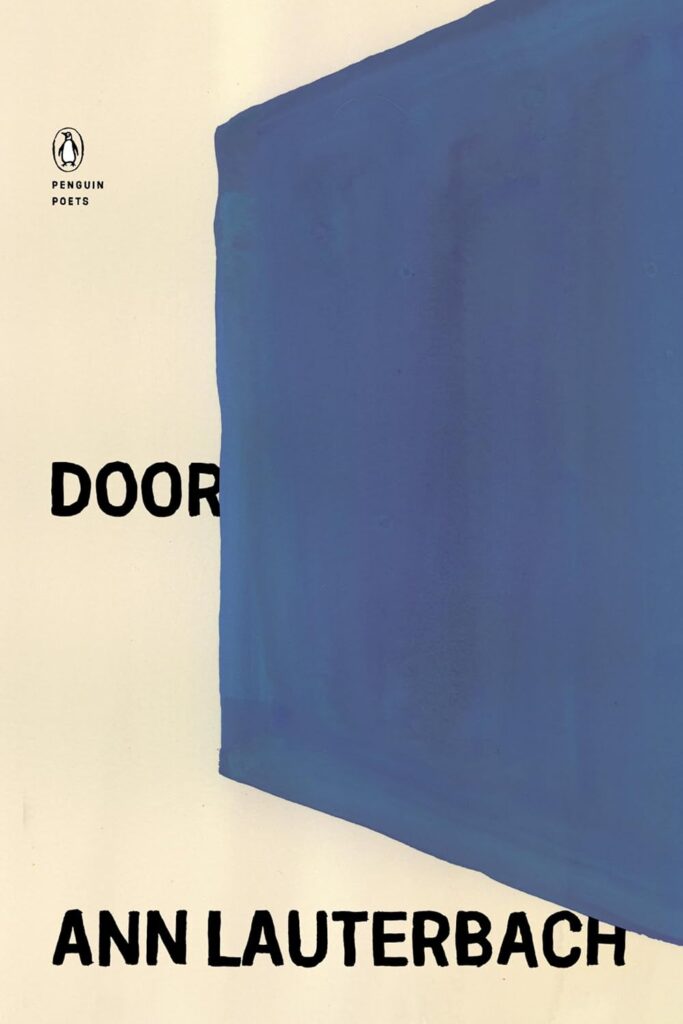Door
Door, by Ann Lauterbach.
Penguin Books, 2023,
94 pages, paper, $20.00,
ISBN: 978–0–14–313737–5
Poet and essayist Ann Lauterbach has published more than thirteen books of poetry and prose. In her newest volume, Door (2023), what is notable is the way Lauterbach has extended her capacity for suspending the reader in a feeling that eludes language. By unraveling syntax and playfully juggling language, by crafting fragments of text that accrue and build on the page, Lauterbach delays, or even perennially defers, the arrival of concrete meaning.
Replete with artfully crafted, jewel–like passages, the poems offer the mysteries of praxis, the complexities of opacity, and places where readers might arrive, and yet — the poet forestalling desire — do not arrive. This new collection contains eight poems titled “Door,” and many more of the poems explore thresholds and crossings, state changes between one place and another, psychological, physical or spiritual. Often these openings and closings are connected to the flow of thoughts, and often the crossing is provisional, a not yet that involves doubt, hesitation and fear, and that retains all possibility, allowing for vital reader participation in meaning–making.
In the very first poem, “Door,” the “world fills up” at an “imperious pace.” Here, an inventory — in other places, an accounting — is reflected by an excess in language and in things, the too–much–ness of life, where meaning seems to overflow and run off:
the ravenous real
flowering
above torsion of waves
unexpected
threshold
thrown open crossed.
Despite its fullness, the poem is a scant sixteen lines, and in this spare beginning we are introduced to Lauterbach’s linguistic leaps and layered images within this volume.
In the beautiful poem “An Interior,” the speaker turns her back on the outside world — one imagines her closing a door — on the mountains, the sun, and the river, to stare at the spines of books: “The spines of books hold a chorus / singing from the dead to the living, / and from the living back to the dead.” Books communicate across seemingly impenetrable thresholds and offer the speaker a means to connect with those who are gone. Here, and in other poems in this collection, an underlying current of grief and loss surfaces; words themselves are tools that both connect and foreclose connection.
The spines’ address is inward and outward,
the once and never more recurring, binding
there into here, like the quick shadow of that bird.
But words don’t care about you, the poet reminds us in another poem, (“On Relation”), “Words are indifferent to how you are feeling about // your feelings.” Words “congregate among themselves” safe from your “desire / to have them meet you exactly where or as meaning // is.” It is this hinged understanding of language that inflects the provisionality of meaning in the poems; language connects — it crosses a threshold between thing and meaning, between self and other — but it also can close things off, create a kind of death or define a limitation.
The eleven–page poem that inhabits the center of the book, titled “Door,” reflects on this power of language to limit and close off meaning, and the slipperiness of our choice in the matter: “The Said closes, is closing, has closed the door.” And:
There is nothing behind the door; there is only
door, a condition, a prospect, a
perception in which a gap occurs, or might
occur, and you can step into or across, you
can leap or fall, you can turn away, go back,
It’s an open–and–shut choice; it’s a dare.
And then, in “Nights in the Asyntactical World,” words pile up and language falls apart:
After lens doubt formidable recess pulse drawing matter
sign of curtain trigger namesake token permanent closure
aching for rhythm literal extension dusted power permission
came lately drawn callow predicate Latin tarnished flickering
ball.
Could this falling apart be a door? Can words thus disordered keep the world in suspension and keep the reader there too, where experience isn’t closed off or shut down? Can we, through language, inhabit the perpetual, unfolding now? “What undergirds / these words? What might be found?” she asks the reader in one of the final poems in the collection, “Blue Door”:
In this atmosphere, nothing is shut, and so motion is the rule, motion without time . . .
— Julie Poitras–Santos


